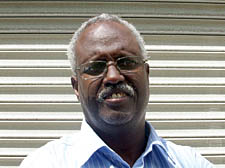| |

Omar Yusuf: ‘Preventative measures should immediately be put in place’ |
We must act now to stop the cycle of violence and revenge
Omar Yusuf, chairman of the Camden Somali Forum, tells of a community’s despair in the wake of Sharma’arke Hassan’s death
THE tragic death of Sharma’arke Hassan last Wednesday after he was shot four days earlier has shaken the community, the vast majority of whom live in fear and uneasy resignation to more painful incidents to follow.
The Somali community in Camden, as in the rest of the country, is a relatively new community, which has arrived in large numbers in recent years as a result of the political upheavals and the civil war that is still raging more than 18 years later.
Between 8,000 and 11,000 Somalis live in Camden, the result of migrations that mainly took place between 1992 and 1996, beginning from southern Somalia where anywhere between 500,000 and one million people died.
While initially it was the middle classes who had the resources to leave Somalia – and who were regarded with suspicion by a militia who thought they would try to leave with their wealth – later on others came over, and it was the rural poor who were perhaps the hardest-hit victims.
Similarly, although the fighting initially affected one of the three main tribal groups, Somalis of all tribes have since been affected. Once here, the experience of refugees is that we are all Somali.
We are disadvantaged by difficult cultural and communication barriers, which make our daily living a constant struggle – so much so that the majority of us haven’t adapted to the new environment.
These difficulties are compounded by the fact most of us have arrived with heavy baggage in the form of traumatic and depressing experiences and the sad loss of family members and loved ones.
As a result, the majority are excluded from the rest of the community and are indeed consigned to remain on the periphery of the society for years to come.
These latest shootings of two of our youth have made most of the community angry at what they perceive as the authorities’ and the police’s lack of interest in taking any preventative steps to defuse the tug-of-war and revenge beatings and attacks that have been on-going for some time between the two rival gangs in Camden.
The common perception of the majority of the community is that the local authority and police have more worthy and more important causes and activities to spend public funds and resources on than rival anti-social gangs from BME communities senselessly beating each other.
That might well be off the mark and in my opinion, based on my dealings with both authorities, an unjustified assessment of the situation.
But it is a view that is widely held and could, in my view, damage the community’s relationship with the authorities and perhaps might adversely affect its engagement with the rest of the community, which was poor, if not non-existent, in the first place.
I firmly believe that well thought out preventative measures should immediately be put in place, so that the situation doesn’t get any worse through revenge attacks in the short term, which is what we – like many others, including the police – are most concerned about.
As to the long-term situation of our community, that is much more complicated and more challenging than anyone can envisage, given the uncovered gaps in its needs and the difficulties it faces. I would say that it needs more reflection and careful assessment before any conclusions are made.
For what it is worth, we at the Somali Forum in Camden pledge our wholehearted support for any positive activities to reverse the current trend of our community.
We really are grateful to New Journal for being able to express our community’s current state of combined anger and despair, particularly considering that the lack of media interest in our community except on the few occasions when an unfairly negative profile of violence and criminality is painted of the whole community as a result of isolated incidents involving young people, who are strangely more British than Somali in their thinking and outlook.
|
 |
|
| |